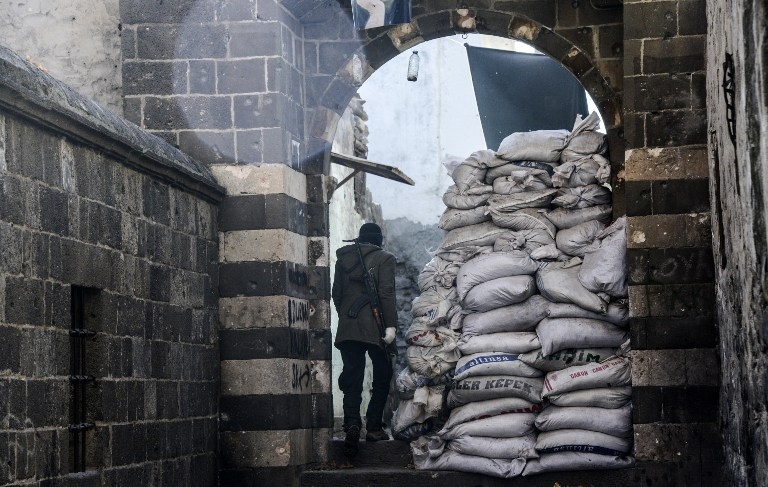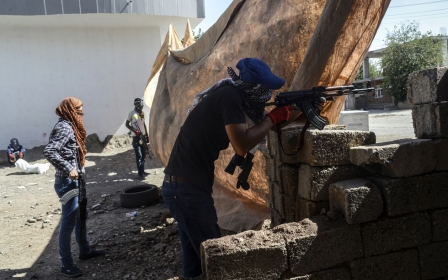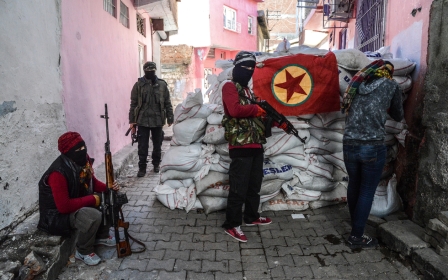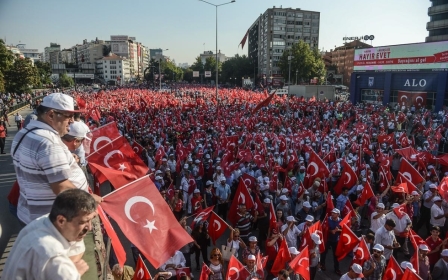PKK’s trenches shouldn’t obscure Turkey’s view of the Kurdish issue

Ripples of bullets are echoing across the Sur district in Diyarbakir, while the ominous news is decorating the front page of newspapers. Digging trenches, building barricades, and utilising brute force have become the hallmarks of the Kurdistan Worker Party’s (PKK) strategy in this recent mindless low-intensity warfare. The government has responded by returning fire with fire and imposing curfews on the PKK-occupied towns and districts.
For the pro-peace camp, this scenery is disheartening. Previously, many believed that Turkey and the PKK had travelled too far in the peace process to go back to square one of the fighting let alone to bring the fight to the urban centres and throw it into the daily life of ordinary people. But this is exactly what is happening at present.
Since the termination of the two-and-half-year-long ceasefire between Turkey and the PKK in the aftermath of the PKK’s killing of two police officers on 22 July, discouraging images and reporting as regards the Kurdish issue have become order of the day in Turkey.
Initial on and off fighting spiralled into urban warfare. The humanitarian, political, and economic costs of this recent conflict are becoming too heavy. The loss of lives resulting from this fight has long reached three digit numbers. Tens of thousands of people have fled from their impoverished neighbourhoods and homes, a journey from known destitution to unknown sufferings of all kind. Keeping track of the business closures and rising unemployment in the affected areas has become a hard task.
It is therefore valid to ask why the PKK is once again resorting to violence and how justified is it? And how wise has the government been in its response? And what do all these developments mean for Turkey’s Kurdish issue?
The PKK isn’t resorting to a violence of necessity or inevitability. Rather it is employing a violence of choice. And it is striving to increase the societal support for this strategy. Though the PKK’s new strategy doesn’t receive the support of the whole constituency of the Kurdish movement, it does from a considerable chunk of it. For that purpose, the PKK will welcome the heavy-handed approach of the state in using brute force in order to gain the support of the section of its constituency who aren’t persuaded on the wisdom of the PKK’s new urban warfare strategy. Therefore, the government needs to strike a fine balance between establishing public order in the PKK-occupied places and avoiding overreaction.
In addition, while engaging in this fighting, the government shouldn’t lose sight of the Kurdish issue. The belief in the possibility of a peaceful and political solution to the Kurdish issue is in grave danger of becoming a casualty of this fight. Turkey has already invested much energy and time in cultivating societal support for the peaceful resolution of the issue, and this effort has paid off handsomely as public support for the process stood above 60 percent prior to the resumption of the violence. This was making the task of politicians relatively easier, even though they haven’t shown sufficient political dexterity to capitalise on this permissive momentum as much as they could.
Evaporation of public support will render the task of the resuming any kind of process harder to achieve down the road - and sooner or later a table will be set for the resumption of talks. Hence it is crucial to avoid re-securitisation of the Kurdish issue and to keep the belief in the political solution of the issue alive by undertaking political and legal steps even when the fight with the PKK is going on.
If the government puts the whole Kurdish file on hold while fighting against the PKK continues, that will only feed into the PKK’s narrative that it is the sole representative and carrier of the Kurdish cause. The PKK is the result of the Kurdish issue, but it is long overdue to treat it as a chapter of the Kurdish issue, thereby reducing it to its real size.
In other words, the Kurdish issue that we are referring to in its current form has two dimensions: the PKK and the Kurdish people. Since it is the PKK that has the arms and fights against the government, it is clear that in one way or another the PKK is and will be the government’s primary interlocutor, with whom the government will seek to settle the over three-decades-long conflict in Turkey.
It nevertheless seems that the PKK isn’t yet ready to completely renounce armed fighting in Turkey, hence it is likely that it will take a while before talks on the cessation of hostilities will resume. The PKK has yet to reconcile itself to a post-conflict period and devise a new role and roadmap for itself in this period. But Turkey shouldn’t squander any time in responding to the Kurdish people’s demands. Turkey can initiate a constitutional debate on stripping its citizenship clause of its ethnic tones, paving the way for education in the mother tongue at all levels of the public schools, and taking steps towards some form of decentralisation.
These steps alone will not deliver the peace that Turks and Kurds alike are longing for; it will not solve Turkey’s PKK-induced challenges altogether. But it will alleviate them by reducing more and more the Kurdish colour of the PKK’s demands. There is some level of decoupling between the PKK’s projections and Kurdish people’s aspirations. Turkey should seize upon this opportunity, and by doing so weaken the militants' narrative of PKK equals the Kurdish issue.
To be able to do so requires the governmens to revisit its conception of the Kurdish issue. The Kurdish issue has long ceased to be an outgrowth of Turkey’s democracy deficit. It is essentially about sharing the sovereignty of the country, at least in a designated part of it. But there are different modalities and forms of sharing sovereignty and the methods of achieving this.
The government has enough political capital to contemplate a form of decentralisation and undertaking legal/constitutional changes towards the Kurds while fighting to stave off the PKK’s attempt to create a "mini Syria" in the Kurdish region of Turkey.
- Galip Dalay works as a research director at al-Sharq Forum and senior associate fellow on Turkey and Kurdish Affairs at the Al Jazeera Centre for Studies.
The views expressed in this article belong to the author and do not necessarily reflect the editorial policy of Middle East Eye.
Photo: A Kurdish militant walks through barricades in Turkey's Sur district in Diyarbakir on 11 December, 2015 (AFP).
Stay informed with MEE's newsletters
Sign up to get the latest alerts, insights and analysis, starting with Turkey Unpacked
Middle East Eye delivers independent and unrivalled coverage and analysis of the Middle East, North Africa and beyond. To learn more about republishing this content and the associated fees, please fill out this form. More about MEE can be found here.





